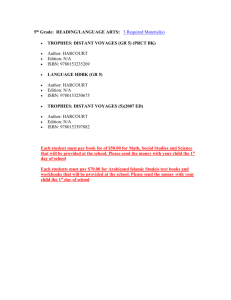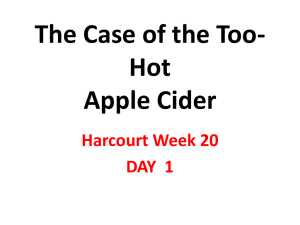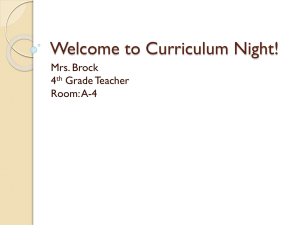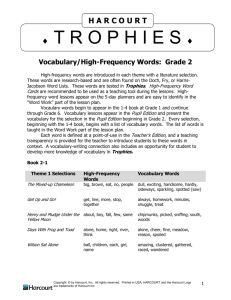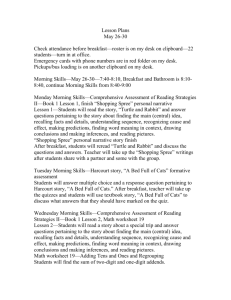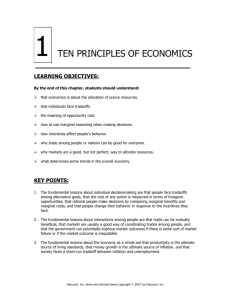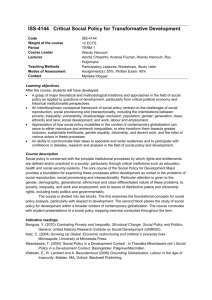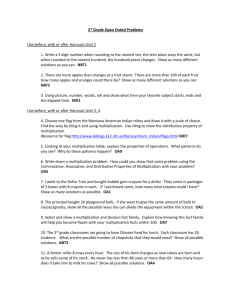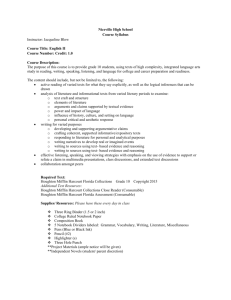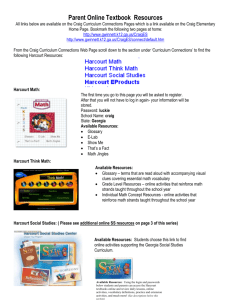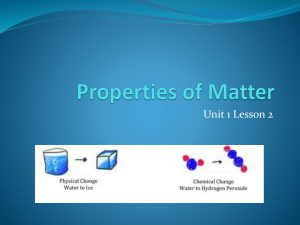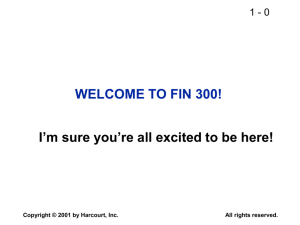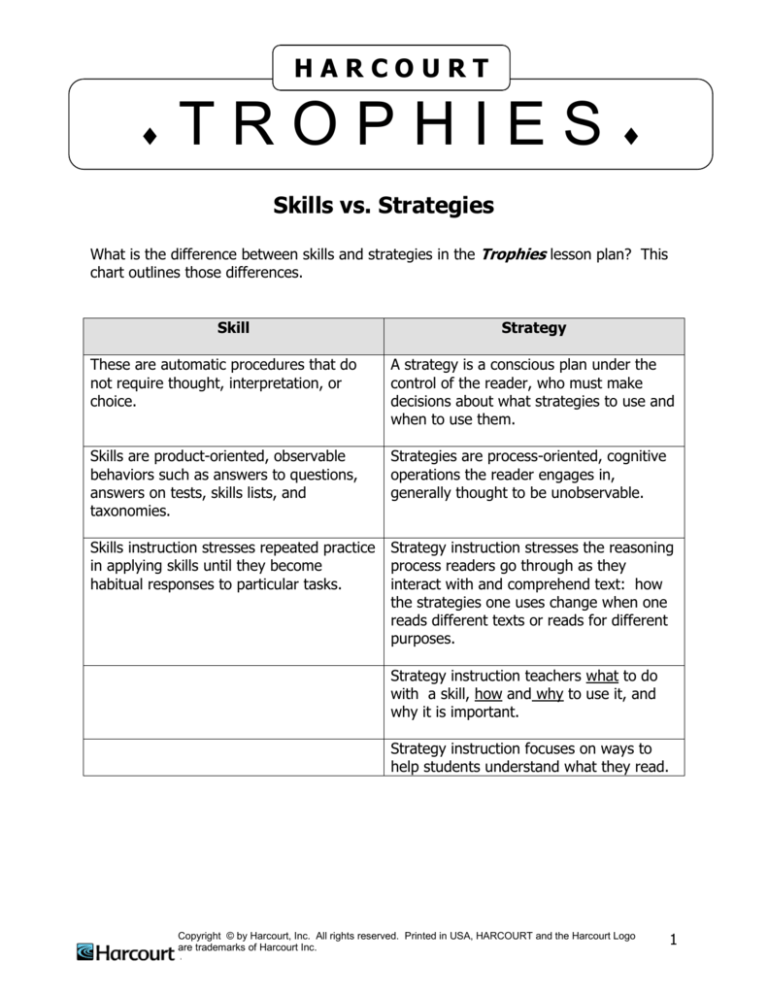
HARCOURT
TROPHIES
Skills vs. Strategies
What is the difference between skills and strategies in the Trophies lesson plan? This
chart outlines those differences.
Skill
Strategy
These are automatic procedures that do
not require thought, interpretation, or
choice.
A strategy is a conscious plan under the
control of the reader, who must make
decisions about what strategies to use and
when to use them.
Skills are product-oriented, observable
behaviors such as answers to questions,
answers on tests, skills lists, and
taxonomies.
Strategies are process-oriented, cognitive
operations the reader engages in,
generally thought to be unobservable.
Skills instruction stresses repeated practice
in applying skills until they become
habitual responses to particular tasks.
Strategy instruction stresses the reasoning
process readers go through as they
interact with and comprehend text: how
the strategies one uses change when one
reads different texts or reads for different
purposes.
Strategy instruction teachers what to do
with a skill, how and why to use it, and
why it is important.
Strategy instruction focuses on ways to
help students understand what they read.
Copyright © by Harcourt, Inc. All rights reserved. Printed in USA, HARCOURT and the Harcourt Logo
are trademarks of Harcourt Inc.
1
HARCOURT
TROPHIES
Focus Skills and Focus Strategies
Focus Skill
Reading skills are taught in Trophies because they build reading
comprehension. Specific skills are taught before, during, and after reading the
selection. Each skill is introduces, reviewed, and maintained. Students have the
opportunity to practice and apply the skills to become skillful readers. A Focus Skill is
introduced and developed in each selection found in Trophies. These Focus Skills are
identified on the 5-day planner with objectives for each selection. The Focus Skill can
be easily traced because of the Skill Trace box found in the margins of the lesson plans
in the Teacher’s Edition. The box includes the skill, the page numbers where it is
introduced, reteach activity pages, review pages, activity pages to maintain the skill,
and a test page for tested skills.
Focus Strategy
A reading strategy is developed in each selection found in Trophies. A list of
these strategies is located in the front of the Teacher’s Edition and Pupil Edition (grades
2-6). There are 10 reading Focus Strategies (Strategies Good Readers Use) taught in
Trophies. Each strategy is a plan that helps students monitor their own reading. As
students become better readers, they are better able to comprehend the selections
because of application of the Focus Strategy. Reading strategies are not developed
automatically. Before student read stories and articles independently, teachers model
strategic reading and thinking behaviors. These modeled strategies teach students to
construct meaning when reading. A good repertoire of strategies builds flexibility in
how student read. They can learn a variety of approaches to reading no matter what
the text.
Copyright © by Harcourt, Inc. All rights reserved. Printed in USA, HARCOURT and the Harcourt Logo
are trademarks of Harcourt Inc.
2
HARCOURT
TROPHIES
Focus Skills and Focus Strategy Lessons
Grade 1
Story
The Hat
Sam and the Bag
Ants
Jack and Rick
Todd’s Box
All That Corn
Dan’s Pet
Boots for Beth
Space Pup
Where Do Frogs Come From?
Try Your Best
Fun with Fish
I Am a Butterfly
Did You See Chip?
Tomás Rivera
On the Way to the Pond
Friends Forever
The Fox and the Stork
A Bed Full of Cats
Me on the Map
At Home Around the World
Tell Me a Story
My Robot
On the Job with Dr. Martha Smith
Little Bear’s Friend
Busy Buzzy Bee
The Story of a Blue Bird
Frog and Toad All Year
Fishing Bears
How to Be a Nature Detective
The Puddle
Poppleton Everyday
Sleep Is for Everyone
Baboon
Focus Skill
Sequence
Predict Outcomes
Details
Sequence
Draw conclusions
Sequence
Setting
Cause/Effect
Cause/Effect
Details
Character
Details
Predict Outcomes
Setting
Character
Setting
Fact/Fiction
Character
Alphabetize
Classify/Categorize
Classify/Categorize
Alphabetize
Fantasy/Reality
Classify/Categorize
Alphabetize
Cause/Effect
Plot
Cause/Effect
Main Idea
Main Idea
Plot
Predict Outcomes
Main Idea
Plot
Focus Strategy
Use Decoding/Phonics
Reread Aloud
Use Decoding/Phonics
Make and Confirm Predictions
Make Inferences
Self-Correct
Create Mental Images
Sequence Events/Summarize
Reread
Look for Word Bits and Parts
Self-Correct
Reread Aloud
Look for Word Bits and Parts
Make Inferences
Sequence Events/Summarize
Read Ahead
Reread
Make and Confirm Predictions
Make and Confirm Predictions
Sequence Events/Summarize
Look for Word Bits and Parts
Create Mental Images
Reread Aloud
Read Ahead
Create Mental Images
Reread
Look for Word Bits and Parts
Reread
Self-Correct
Read Ahead
Make Inferences
Use Decoding/Phonics
Make Inferences
Sequence Events/Summarize
Copyright © by Harcourt, Inc. All rights reserved. Printed in USA, HARCOURT and the Harcourt Logo
are trademarks of Harcourt Inc.
3

